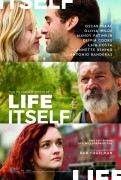Life Itself Movie Review
 |
Life Itself
Theatrical Release: September 21, 2018 / Running Time: 118 Minutes / Rating: R Writer/Director: Dan Fogelman Cast: Oscar Isaac (Will Dempsey), Olivia Wilde (Abby Dempsey), Annette Bening (Dr. Cait Morris), Mandy Patinkin (Irwin Dempsey), Jean Smart (Linda Dempsey), Olivia Cooke (Dylan Dempsey), Sergio Peris-Mencheta (Javier González), Antonio Banderas (Mr. Saccione), Laia Costa (Isabel Diaz), Alex Monner (Rodrigo González Diaz), Samuel L. Jackson (Himself/Unreliable Narrator), Isabel Durant (Shari Dickstein), Lorenza Izzo (Elena), Jake Robinson (Henry/Hero), Adrian Marrero (Rodrigo at 7-10 Years Old), Kya Kruse (Young Dylan) |
It felt like Dan Fogelman's movie career was about to take off after writing 2011's Crazy, Stupid, Love. The sentimental romantic dramedy was respected by critics and well-attended by moviegoers, whose approval continues to be reflected in a strong 7.4 IMDb user rating. Fogelman, who had already created a short-lived TV series and contributed to the screenplays of animated hits like Cars and Tangled, The failure of Fogelman's effort seemed to send him back to television, where he created a couple more short-lived series and one that now stands as his biggest achievement to date in NBC's still-running and widely liked "This Is Us." On the eve of that hour-long dramedy's third season premiere, Fogelman returns to the big screen as the writer-director of Life Itself. Of the filmmaker's somewhat varied work, this latest film most directly recalls Crazy, Stupid, Love. with its distinct, connected, multi-generational storylines, self-satisfied, surprise-heavy narrative, and maudlin stylings.
At first glance, Fogelman seems to be challenging himself with a Charlie Kaufman-esque opening that has Samuel L. Jackson serving as an unreliable narrator. That device is a big theme here, having been the subject of one character's thesis paper and evidently striking Fogelman as one of a few expectation-subverting techniques to explore here.
Divided into four separate acts with moderate linkage, Life Itself trots out its most accessible and heavily marketed arc first. It involves the romance of New Yorkers Will (Oscar Isaac) and Abby (Olivia Wilde). Oh, they're just so darn precious. They have a dog named Fuckface and they lie in bed laughing and arguing over the nasal sound and artistic merit of later Bob Dylan, specifically the 1997 song "Make You Feel My Love" that is turned into the central motif of Federico Jusid's score.
We jump around in the couple's time together, seeing them meet as fresh-faced college students, Will justifying his hestitation to ask her out with a ludicrous monologue, and the two attending a costume party as John Travolta and Uma Thurman's Pulp Fiction characters. Though one moment they're happily cuddling, listening to Dylan, and awaiting the birth of their first child, at other times Will is single, thickly bearded, and severely depressed. Their separation, not what it seems, has led to him being institutionalized, seeing a therapist (Annette Bening), and crafting the screenplay that serves as the film's fake-out opening, whose wretched ideas you'll come to discover are not that far from the ones that Fogelman actually poses in this downer material.
Act Two involves Will and Abby's daughter, naturally named Dylan, who grows up (becoming Olivia Cooke) as her grandfather (Mandy Patinkin) grows old and gray. She becomes an angsty teenager in a band. This is by far the film's shortest and slightest arc.
In the third act, we move to Spain and the Spanish language to find wealthy businessman Mr. Saccione (Antonio Banderas) sitting down and having a drink with Javier (Sergio Peris-Mencheta), his most dutiful olive farmer. In the process of promoting Javier to live-in farm foreman, Saccione shares his own story as the product of a dastardly Italian father and a saintly Spanish mother. Javier is as unmoved as many viewers might be, even if they're receptive of the unexpected shift to English subtitles.
The fourth and final act involves Javier's son Rodrigo (Ŕlex Monner), who grows up a product of an unusual home and eventually enrolls at NYU while his loving mother (Laia Costa) battles terminal illness.
How do these stories all tie together? In a number of ways, none of which I can reveal to you and none of which you are likely to find as clever as Fogelman does. The same features that made Crazy so unlikable for me -- misleading design, hidden ties, unabashed saccharinity -- are all back in full force here. On the plus side, you've got to concede that Fogelman has a unique playbook and voice on what at least feels like his signature film work. He is clever, conscientious, and very interested in life connecting in strange and unexpected ways. It is easy to appreciate the passion that Fogelman pours into his universe and when he's drawing bits of dialogue from his own family interactions (Patinkin's character almost certainly seems to be based on the writer's father). But that appreciation fades when you're cringing on a regular basis as he tries so hard to warm your heart and nourish your soul. He clearly cares deeply about his characters. Unfortunately, you will not, as there isn't a single one who strikes you as a relatable real human being and not the invention of a screenwriter desperately trying to be pithy. Though lacking the star power of Crazy (which included Steve Carell, Ryan Gosling, and Emma Stone), Life Itself assembles seasoned, in-demand actors, but even they have no way of making this material play authentically.
The surprising R rating, earned by a liberal use of the F word, feels like a major commercial hurdle that the movie doesn't need. While this is a film best enjoyed by adults and presumably the average viewer will be well over 17, it's a corny affair that would be best appreciated by the infrequent moviegoer who bristles at profanity. Between that creative choice and the fact that secretly half the movie is subtitled, Life Itself will most likely not draw the crowds and repeat business of Fogelman's most successful live-action screenplay. There is clear room for Fogelman to grow as both a writer and director. Part of me hopes he gets the opportunity to do so and part of me hopes he just stops altogether if he cannot resist the urge to subject viewers to such unintelligent, twisty, artificial mush packaged like a quality fall movie for thinking adults. Let's hope no one looking for Steve James' fine Roger Ebert documentary from a few years ago ends up watching this instead.
|
Related Reviews:
DVDizzy.com | DVD and Blu-ray Reviews | New and Upcoming DVD & Blu-ray Schedule | Upcoming Cover Art | Search This Site
DVDizzy.com Top Stories:
Now in Theaters: The House with a Clock in Its Walls • The Predator • The Nun
Written by Dan Fogelman: Crazy, Stupid, Love. • Danny Collins • The Guilt Trip • The Neighbors: The Complete First Season
Olivia Wilde: Third Person • The Words • Butter • Love the Coopers • People Like Us | Oscar Isaac: Inside Llewyn Davis • Suburbicon • Drive
Mandy Patinkin: Wonder • The Princess Bride | Olivia Cooke: Ready Player One • Bates Motel: Season One • Me and Earl and the Dying Girl
Antonio Banderas: Automata • The 33 • You Will Meet a Tall Dark Stranger
Collateral Beauty • The Book of Henry
Text copyright 2018 DVDizzy.com. Images copyright 2018 Amazon Studios.
Unauthorized reproduction prohibited.

